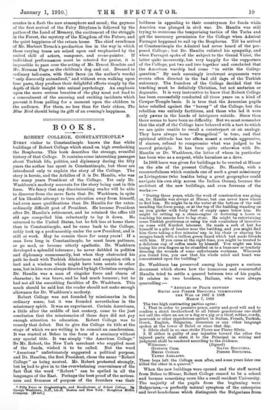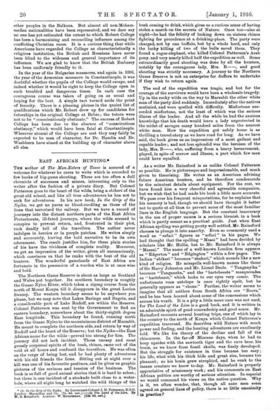BOOKS.
ROBERT COLLEGE, CONSTANTINOPLE.* EvERY visitor to Constantinople knows the fine white buildings of Robert College which stand on high overlooking the. Bosphorus. This book describes the strange, eventful history of that College. It contains some interesting passages about Turkish life, politics, and diplomacy during the fifty years the author has spent in Constantinople, but these are introduced only to explain the story of the College. The story is heroic, and the Achilles of it is Dr. Hamlin, who was for many years President of the College. Yet only Dr. Washburn's modesty accounts for the story being cast in this form. We fancy that any discriminating reader will be able to discover from the mere facts that Dr. Washburn, in spite of his likeable attempt to turn attention away from himself, had even more qualifications than Dr. Hamlin for the extra- ordinarily difficult post of President. He became President after Dr. Hamlin's retirement, and he retained the office till old age compelled him reluctantly to lay it down. He returned to the United States, but he felt less at home there than in Constantinople, and he came back to the College, nobly took up a professorship under the new President, and is still at work. May he remain there for many years ! If a man lives long in Constantinople, he must learn patience, or go mad, or become utterly apathetic. Dr. Washburn developed a splendid tolerance ; he never dabbled in politics and diplomacy unnecessarily, but when they obstructed his path he dealt with Turkish dilatoriness and suspicion with a tact and a wisdom which might have been astute in other men, but in him were always directed by high Christian scruples. Dr. Hamlin was a man of singular force and charm of character; be was brave, and he had much humour; but he had not all the smoothing faculties of Dr. Washburn. This much should be said lest the reader should not make enough allowance for Dr. Washburn's modesty.
Robert College was not founded by missionaries in the ordinary sense, but it was founded nevertheless in the missionary spirit. It was an experiment. Certain Americans, a little after the middle of last century, came to the just conclusion that the missionaries of those days did not pay enough attention to education. Robert College was to remedy that defect. But to give the College its title at the stage of which we are writing is to commit an anachronism. It was started at Bebec in the form of a seminary without any special title. It was simply " the American College." So Mr. Robert, the New York merchant who supplied moat of the funds, wished it to be called. But the word "American" unfortunately suggested a political purpose, and Dr. Hamlim, the first President, chose the name "Robert' College " as being neutral. Mr. Robert protested strongly, but he had to give in to the overwhelming convenience of the fact amt the word "Robert " can be spelled in all the languages of the East. Perhaps the best proof of the serious- Ilia and firmness of purpose of the founders was their
1! Nifty Years en Conditanttineelo, and Bee,ollectioas of Rawl College. George Washburn, D. W. Boston and New York : Houghton Mt fin Company. [ 3 net.]
boldness in appealing to their countrymen for funds while America was plunged in civil war. Dr. Mamlin was still trying to overcome the temporiaing tactics of the Turks and get the necessary permission for the College when Admiral Farragut happened to sail up the Boaphorua. Till he arrived at Constantinople the Admiral had never heard of the pro- posed College ; but Dr. Hamlin enlisted his sympathy, and when Farragut spoke of the subject to the Grand Vizier, the latter quite incorrectly, but very happily for the supporters of the College, put two and two together and concluded that the American warship bad come " to settle the College question." By such amusingly irrelevant arguments were events often directed in the bad old days of the Turkish autocracy. The founders of the College decided that the teaching must be definitely Christian, but not sectarian or dogmatic. It is very instructive to 'know that Robert College has been successfully conducted all these years on a kind of Cowper-Temple basis. It is true that the Armenian pupils later rebelled against the " heresy " of the College, but tho rebellion was entirely factitious, and those who led it were only pawns in the hands of intriguers outside. Since then there seems to have been no difficulty. But we must remember that the staff of the College have behaved with a tact to which we are quite unable to recall a counterpart or an analogy.
They have always been " Evangelical " in tone, and that spiritual attitude has too often meant a certain aggressive, if sincere, refusal to compromise what was judged to be sacred principle. It has been quite otherwise with Dr. Hamlin or Dr. Washburn, the latter of whom in particular has been wise as a serpent, while harmless as a dove.
In 1868 leave was given for buildings to be erected at Hissar on the site of the present College. Dr. Hamlin, with a resourcefulness which reminds one of such a great missionary as Livingstone (who besides being a great geographer could navigate his own ship across the Indian Ocean), became the architect of the new buildings, and even foreman of the works :—
" During those years, while the work of construction was going on, Dr Hamlin was always at Hissar, but one never knew where to find him. He might be in the water at the bottom of the well mending the force puny, or at the top of the building standing on an iron girder with forty feet of empty space below him. He might be setting up a steam-engine or doctoring a horse or teaching his masons how to lay stone. He might be entertaining some Turkish gentleman or using his rich vocabulary of invective on some wild Kurdish labourer. He, made a sort of but for himself in a pile of lumber near the building, and you might find him there taking a five minutes' nap in his chair or sharing his meagre lunch with a tailless green hzard which had made friends with him. If you came at the right time, you might be treated to a delicious cup of coffee made by himself. You might see him losing his own fingers as he stumbled on to a buzz-saw or tenderly dressing the wounds of some unfortunate workman. Wherever you found him, you saw that his whole mind and heart was concentrated upon the building."
Dr. Washburn has preserved among his papers a curious document which shows how the humorous and resourceful Hamlin tried to settle a quarrel between two of his pupils. It relates to two brothers, Italians, who were always quarrelling :—
"ARTICLES Or PEACE BETWEEN SILVIO AND PIERRE BISCIICHIA TERMINATING TRH. WAR ON 1867 k 1868 Maraca 7, 1868
The two high contracting parties agree: 1. That in order to preserve peace, amity and good will and to confirm a strict brotherhood to all future generations one shall not call the other an ass or a dog or a pig or a thief, robber, rowdy, pezevenk or other opprobrious epithet in Italian, French, Turkish, Greek, English, Bulgarian, Armenian or any other language spoken at the tower of Babel or since that day. 2. Silvio shall in no case strike Pierre nor Pierre Silvio.
3. If either is guilty of any injustice toward the other the injured party shall state it to the Principal in writing and judgment shall be rendered according to the evidence.
Witnesses : (Signed)
GUSTAVE CAZE. SILVIO Bnscucure.
HENRI COMAE. PIERRE BISCUCHIA.
YANICO AGELASTO.
These boys left the College soon after, and some years later one, killed the other in a quarreL"
When the new buildings were opened and the staff moved from Bebec to Hissar, Robert College ceased to be a school and became something more like a small resident University. The majority of the pupils from the beginning were Bulgarians,—a perfectly natural symptom of the enterprise and level-headedness which distinguish the Bulgarians „from other peoples in the Balkans. But almost all non-Moham- medan nationalities have been represented, and we dare say no one has yet estimated the extent to which Robert College has been a harmonising and reconciling influence among the conflicting Christian races. It is a curious thing that while Americans have regarded the College as characteristically a religious institution, the British and Russians have never been blind to the wideness and general importance of its influence. We are glad to know that the British Embassy has been uniformly friendly to it.
In the year of the Bulgarian massacres, and again in 1896, the year of the Armenian massacre in Constantinople, it was doubtful whether the pupils of the College would escape, and indeed whether it would be right to keep the College open in such troubled and dangerous times. In each case the courageous course was taken of going on as usual and hoping for the best. A simple tact turned aside the point of ferocity. There is a pleasing phrase in the quaint list of qualifications which Mr. Robert drew up for candidates for tutorships in the original College at Bebec ; the tutors were not to be " conscientiously obstinate." The success of Robert College has been due to the absence of "conscientious obstinacy," which would have been fatal at Constantinople. Wherever alumni of the College are met they may fairly be expected to be men of character, for Dr. Hamlin and Dr. Washburn have aimed at the building up of character above all else.















































 Previous page
Previous page